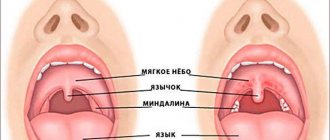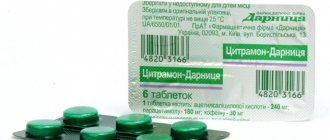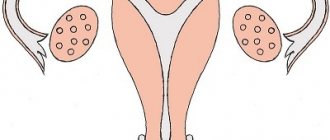If you are going to become a mother, but have not yet had time to visit an endocrinologist, then do so as soon as possible. It is he who will check the thyroid gland - the most important organ that affects the health and development of the baby. While carrying a baby, the production of thyroid hormones increases on average by 40 percent, and therefore the daily need for iodine, their essential component, also increases. A lack of the mineral during pregnancy can lead to irreversible pathologies of the fetus and, according to doctors, directly affects the mental abilities of the child in the future. Therefore, many pregnant women are prescribed Iodomarin.
- 2 In what trimester do doctors recommend pregnant women take iodine supplements?
2.1 An endocrinologist’s point of view on the importance of iodine for the body and explanations on the functioning of the thyroid gland - video
- 2.2 Iodomarin with what dosage to choose during pregnancy
- 3.1 Harm of iodine overdose
- 5.1 Analogues of Iodomarin - photo gallery
Iodomarin: composition, action and application
Iodomarin is a medicine produced in Germany. Its active ingredient is potassium iodide. The main purpose of the drug is to compensate for iodine deficiency, ensuring normal function of the thyroid gland and preventing its diseases. Thus, the use of tablets is possible for:
- treatment and prevention of diseases caused by iodine deficiency in the body;
- prevention of goiter recurrence after its surgical removal or successful treatment with hormonal drugs.
The need for nutrients in expectant mothers increases, so it is especially important that enough iodine enters their body. According to the instructions, Iodomarin is not only safe for pregnant women, but is recommended for use by them.
Consumption standards
According to WHO, the minimum daily dose of iodine for an adult is 100 mcg. At the same time, we receive no more than 50 mcg from food. For this reason, a microelement deficiency occurs.
During pregnancy, the body's need for iodine increases. A woman expecting a baby needs not 100, but 200 or even 250 mcg. For this reason, doctors prescribe additional iodine supplements for most expectant mothers. This may be Iodomarin or its analogue.
Moreover, most experts recommend taking Iodomarin when planning pregnancy. This will increase the chances of conception and eliminate iodine deficiency in the first weeks, when the risk of miscarriage is highest.
In what trimester do doctors recommend pregnant women take iodine supplements?
A gynecologist can prescribe Iodomarin to a woman, and at the very first appointment, that is, even in the first trimester of pregnancy. This is explained by the fact that the normal function of the thyroid gland is very important precisely at this stage, when the embryo does not yet have its own thyroid gland, and it receives the necessary hormones from the mother.
Gynecologists usually recommend taking iodine not only in the first, but also in the second and third trimesters of pregnancy. There is usually no chance of overdose, given the upper safe limit of 500 mcg/day. And if in the region of your residence the content of the mineral element in the soil is considered insufficient, then prescribing tablets is especially important for the prevention of iodine deficiency.
Iodomarin should be prescribed by an endocrinologist after conducting an examination and studying test results.
But even if your gynecologist prescribed Iodomarin, you definitely need to go to an endocrinologist, get tested for hormones and have your thyroid examined. If, as a result of these actions, it is established that the organ is functioning normally, and the woman receives the required amount of iodine naturally through iodine-containing products, then there is no need to prescribe it additionally.
An endocrinologist's point of view on the importance of iodine for the body and explanations on the functioning of the thyroid gland - video
Iodomarin with what dosage to choose during pregnancy
The drug is available in two dosages:
- 100 mcg of iodine in 1 tablet (Iodomarin 100);
- 200 mcg of iodine in 1 tablet (Iodomarin 200).
According to WHO, the daily requirement for iodine in pregnant women is on average 250 mcg, and the safe upper limit of intake should not exceed 500 mcg. But these data are not the same for different countries of the world. In the USA, the maximum amount of mineral entering the body per day should not exceed 1100 mcg, and in Australia - 2000 mcg. In our country, doctors usually prescribe Iodomarin 200 if the multivitamins that a woman takes do not contain iodine, and Iodomarin 100 when iodine is already present in their composition .
The doctor may prescribe different dosages of the drug
How to Know if You Have Enough Iodine
The thyroid gland influences many processes that occur in the body. Iodine deficiency manifests itself in a variety of symptoms that mimic various diseases.
Signs of a lack of an important microelement are:
- drowsiness;
- increased fatigue;
- apathy, lethargy;
- chronic fatigue;
- hair loss, dry skin, brittle nails;
- low level of stress resistance, memory loss, inhibited reactions;
- excess weight, swelling;
- feeling of chills, decreased immunity;
- imbalance of reproductive functions (infertility, disruption of the menstrual cycle);
- cholelithiasis;
- disruptions in the gastrointestinal tract, constipation.
Sometimes iodine deficiency occurs when smoking, begins in early pregnancy and lasts throughout the entire lactation period, in the case of taking oral contraceptives. The first deviation from the norm is the growth of the thyroid gland in a pathological form. Increasing its size allows you to stock up on iodine during pregnancy, which is needed for the production of hormones. These changes can be diagnosed during examination by a doctor, after an ultrasound. To treat iodine deficiency, the doctor selects a drug.
It is not easy to identify iodine deficiency at the beginning of its development. Need a test. Using a cotton swab dipped in iodine solution, draw lines on the forearm (length - 5 cm):
- thin, translucent;
- medium thickness;
- bright, thick.
The study should be carried out in the evening, a few minutes before bedtime. The result will be available in the morning.
- If there is no first line and the other two are barely noticeable, then there is no iodine deficiency.
- When the oiliest line remains on the skin, preventive measures are needed.
- If all three lines are missing, severe iodine deficiency is observed. This may indicate violations.
IMPORTANT: Iodine levels can be determined using a reliable method: analysis of the hormones T3 and T4 (1:4 ratio). With a reduced level of T3 and an increased level of T4, we can talk about iodine deficiency. After 3-4 days, you should take the tests again (to obtain average values, collect more accurate data and compare them with previous ones). The test results should be shown to an endocrinologist and gynecologist. The doctor will select treatment and correction methods.
You can get iodine from food, dietary supplements and pharmaceutical preparations. It is useful to include iodized salt and seafood in your diet. You should not use Lugol's solution and iodine (to treat the skin) to get rid of iodine deficiency. If you lack this microelement, you need to take medications in tablets (this issue should be discussed with your doctor).
Read more: How do kidney stones pass out in women?
Contraindications and side effects specified by the manufacturer in the instructions
Contraindications, according to the instructions, are as follows:
- hypersensitivity to iodine;
- hyperfunction of the thyroid gland or hyperthyroidism, in which excess amounts of hormones are produced;
- toxic adenoma (benign neoplasm) of the thyroid gland;
- nodular goiter when prescribing high doses of the drug (with the exception of preoperative iodine therapy);
- Dühring's herpetiformis (senile) dermatitis.
The annotation states that, as a rule, no side effects are observed with the prophylactic use of Iodomarin. However, in rare cases, continuous use of pills can lead to:
- development of “iodism”, which is manifested by a metallic taste in the mouth, swelling and inflammation of the mucous membranes (runny nose, conjunctivitis, bronchitis), “iodine fever”, “iodine acne”;
- Quincke's edema;
- exfoliative dermatitis (skin disease caused by Staphylococcus aureus);
- transition of latent hyperthyroidism to a pronounced form;
- the occurrence of thyrotoxicosis (intoxication with thyroid hormones), provoked by excess iodine.
Harm of iodine overdose
An overdose of iodine poses a threat to the expectant mother and her child, so you need to know the symptoms that signal danger:
- staining of the mucous membranes brown;
- reflex vomiting (if starch-containing components are present in food, the vomit becomes blue);
- abdominal pain and diarrhea (possible black, loose stools);
- esophageal stenosis;
- the phenomenon of “iodism”;
- dehydration;
- state of shock.
In case of overdose, you must stop using Iodomarin and consult a doctor.
Excess iodine can lead to the development of hypothyroidism and goiter in a child.
Precautionary measures
The maximum possible daily dose of iodine is 1000 mcg, so a drug containing 100 or 200 mcg of this important microelement is recommended for use without fear. Such doses will not harm the child or woman, even if there is no iodine deficiency in the body, the excess microelement will simply be eliminated naturally.
However, there are conditions in which you cannot drink Iodomarin or an analogue even in the minimum dosage (100 mcg). The product is prohibited for use:
- with hyperfunction of the thyroid gland, as a result of which this organ produces more hormones than necessary;
- with hypersensitivity to iodine;
- with a functioning thyroid adenoma.
In case of hypothyroidism, iodine preparations can be taken only if the disease is caused by a deficiency of the microelement. If the causes of the disease are different, then it is necessary to prescribe replacement therapy, that is, taking artificial hormones.
Negative side effects when taking iodine preparations are extremely rare; as a rule, they are associated with individual intolerance to the drug. But if too many tablets are accidentally taken, symptoms of overdose may appear.
- digestive disorders - diarrhea, vomiting, abdominal pain;
- the appearance of a metallic taste in the mouth;
- redness of mucous membranes.
In case of overdose, medical attention is required.
Simultaneous use of Iodomarin with Eutirox and other drugs
When thyroid function decreases (hypothyroidism), the drug Eutirox is often prescribed. It happens that the doctor also prescribes Iodomarin along with it. Is this justified?
Eutirox and Iodomarin are completely different drugs. The first is a synthetic thyroid hormone, thyroxine, and the second is iodine, which is part of the structure of the hormone when it is produced in the body. During treatment with Euthyrox, Iodomarin is unnecessary. However, there are cases when an endocrinologist can prescribe them simultaneously for complex treatment of thyroid diseases. If in doubt, you need to consult a specialist, and preferably not one, but several.
You need to be very careful with products containing iodine and it is better not to take them together with Iodomarin at all in order to avoid an overdose.
A lot of the mineral is found, for example, in Lugol; it is not recommended for pregnant women.
Simultaneous use of Iodomarin with Eutirox or Lugol may be unsafe
The official instructions on interactions with other drugs describe the possible strengthening or weakening of the effect, as well as the development of side effects when Iodomarin is used together with:
- lithium salts;
- potassium-sparing diuretics;
- substances that inhibit the formation of thyroid hormones.
Element value
Iodine is necessary for the body to ensure normal functions of the thyroid gland, which produces a number of hormones that regulate various body functions. With a lack of hormones, they suffer from:
- the immune system,
- heart,
- CNS.
A person feels constant weakness, his memory deteriorates, sexual desire disappears, and irritability appears. During pregnancy, not only the mother's body suffers from iodine deficiency, but also the developing fetus. Therefore, most women must take iodine supplements during this period. Let's figure out why this microelement is needed at different stages of pregnancy.
In the early stages
The first weeks of pregnancy are a very difficult time. During this period, the formation of embryonic organs occurs, so a deficiency of any substances necessary for the development of the fetus negatively affects its development.
In addition, iodine preparations are recommended for use during this period, since their use reduces the risk of miscarriage and miscarriage.
In the later stages
The need to take iodine supplements in the early stages is clear. But until when should I take Iodomarin or its analogue? As a rule, you have to take the drug for a long time, namely, throughout the entire period of gestation, as well as during the feeding period, since the need for iodine remains consistently high throughout this time.
We invite you to read: Can a pregnant woman... drink carbonated drinks? Carbonated drinks and mineral water during pregnancy
Microelement deficiency in the second and third trimester can lead to:
- to hypoxia (lack of oxygen) of the fetus;
- development of congenital hypothyroidism;
- the appearance of other serious developmental defects, in particular in the skeletal structure.
Analogs of Iodomarin on the market
Iodomarin analogues are drugs with the active substance potassium iodide. They all have similar indications, contraindications, and even identical release form and dosage. The only significant difference is in the manufacturer and price.
Iodomarin analogues - photo gallery
Iodine balance is a German analogue of Iodomarin
Potassium Iodide - domestic analogue of Iodomarin
Microiodide is another Russian analogue of Iodomarin
Reviews from women: to drink or not to drink Iodomarin in the early stages
I was also given this drug during pregnancy. One package, but I deliberately did not take it every day. I took it once every two days. I alternated with Elevit for pregnant women. Since I was recommended to drink it from the 12th week, like vitamins, I finished the course after being discharged from the hospital. I felt fine during the appointment, there were no problems. In general, I perceived the drug as a placebo, I took it just in case, I don’t know how much I needed it.
Ekaterina Grigorieva
https://flap.rf/Medicine/Iodomarin
Iodomarin, like many others, was prescribed to me during pregnancy. Regular white tablets, I took them without problems, I didn’t notice any side effects like nausea or anything else. During pregnancy, I could not particularly highlight the effect of this drug, I drank a lot of everything and in a heap, for a child, iodine, more precisely potassium iodide, is important for development.
Nadezhda S
https://flap.rf/Medicine/Iodomarin
I was prescribed Iodomarin during pregnancy, and the doctor told me to drink it until the last day of breastfeeding. Drink. I don’t do it regularly anymore, I often miss it, it happens. I don’t like taking pills of any kind every day. I took a break somehow, a couple of months, during the year and a half that I was feeding. I feel great, and the pregnancy went well, I had enough energy at work, and still had things to do at home)
Ekaterina F
https://flap.rf/Medicine/Iodomarin
I have always believed that during pregnancy it is better not to take any pills at all, even multivitamins. I have repeatedly read that children's allergies in the first three years of life are very often caused by the fact that the mother took vitamins during pregnancy. During my second pregnancy, I didn’t take any medications, I felt good, and the baby was born strong and healthy. During this pregnancy, when the gynecologist prescribed Iodomarin, Magne B6 and iron, I thought about taking them, because I felt very weak and in general health problems began. But I don’t really trust my gynecologist (out of 6 doctors who should work, two work, the gynecologist is always so tortured that I want to feel sorry for her and not burden her with my problems), so I went to another specialist. A very competent doctor, she explained to me that from a lack of vitamins, especially from a lack of iron and iodine, children are born with low weight, and often with a low level of mental development, up to cretinism. And in my situation, the youngest is only one and a half years old, I stopped breastfeeding him only 3 months ago, and I’m expecting twins, I must take vitamins, iodine and iron until the birth and after it. After weighing all the pros and cons, I decided to take vitamins; of course, there is a risk from taking chemicals (multivitamins, etc.), but in my situation it is lower than the risk of the consequences of a lack of vitamins. So tomorrow I'm going to the pharmacy to get some vitamins











